This is the age of acceleration: technology, globalization, climate change and biodiversity loss are accelerating all at once.
These accelerations are transforming; the workplace, politics, geopolitics, ethics, and community.
Thomas L Friedman; Thank You for Being Late.
Despite the exigencies of the first three industrial revolutions – now referred to by some as ‘productivity revolutions’ – the radical changes made to human interactions were recognisably human.
‘The most-striking evidence for a distinct cognitive contrast between humans and their predecessors comes from Europe. H. sapiens came late to this continent and brought a new kind of stone tool… probably developed in Africa some 75,000 years ago.’ (Encyclopaedia Britannica)
Perhaps the ‘stone tool’ introduced a hitherto unrecorded industrial (productivity) revolution?
From 2016, a fourth industrial revolution (IR4) based on nanotechnology, artificial intelligence (AI) and white-collar robotics is challenging traditional concepts of humanness.
This is something of urgent interest for all who value Freemasonry’s historical and potential role in civil society.
Perhaps it was ‘some 75,000 years ago’, when a ‘distinct cognitive contrast’ took the form of the emergence of a unique capacity for imagination, language, and the invention of stories which were believed and acted upon by other humans.
These cognitive skills differentiated a development from that of other animals. It enabled highly flexible, large scale, global cooperation: this led to a human primacy in and over nature.
The article Freemasonry and Generative AI – Part 2 – The Square Magazine suggests parallel universes of sapiens and human. Perhaps ‘the self’ ‘identity’ could be understood as experience of the world being on seamlines between sapiens and human viz:
|
H. sapiens (Bodily) |
|
Human (Interactional) |
|
Evolution |
S |
Revolution |
|
Nature |
E |
Culture |
|
Brain |
A |
Mind |
|
Gregarious – tribal |
M |
Social – civil society |
|
Cooperation – small, inflexible |
L |
Cooperation – large, flexible |
|
Repetitions |
I |
Conventions |
|
Inductive |
N |
Deductive |
|
Arithmetical |
E |
Grammatical |
|
Descriptive |
S |
Interpretative |
The article Freemasonry and Generative AI – Part 2 – The Square Magazine suggests parallel universes of sapiens and human. Perhaps ‘the self’ ‘identity’ could be understood as experience of the world being on seamlines between sapiens and human viz:
|
H. sapiens (Bodily) |
|
Human (Interactional) |
|
Evolution |
S |
Revolution |
|
Nature |
E |
Culture |
|
Brain |
A |
Mind |
|
Gregarious – tribal |
M |
Social – civil society |
|
Cooperation – small, inflexible |
L |
Cooperation – large, flexible |
|
Repetitions |
I |
Conventions |
|
Inductive |
N |
Deductive |
|
Arithmetical |
E |
Grammatical |
|
Descriptive |
S |
Interpretative |
Perhaps the above table could be considered in conjunction with Daniel Kahneman’s, Thinking Fast and Slow.
The three industrial revolutions left some human arrangements behind; others transformed and survived, some thrived.
As ‘productivity revolutions’, unsurprisingly, their substantial impact was on the production, distribution and consumption of food clothing, shelter, and communication.
As with its predecessors, IR4 is radically altering the basis of productivity; however, in the process, it is disrupting the interactions, arrangements, and relationships which define ‘humanness’.
1. Exponentially, human are outsourcing their faculties to technologies. AI’s increasing mastery of its language is replacing ‘humanspeak’ – the operating system of humanness – with AIspeak’’.
2. ‘AIspeak will go where humans are unable to tread: are machines being trained by humans to train humans?
Will AI overcome, or succumb to, the well-established tendency of power tending to corrupt and absolute power corrupting absolutely: what form might sapiens + human + machine take?
|
H. sapiens (Bodily) |
|
Human (Interactional) |
|
Organic + Inorganic |
|
Evolution |
S |
Revolution |
S |
Iteration |
|
Nature |
E |
Culture |
E |
Biotech |
|
Brain |
A |
Mind |
A |
Processing |
|
Gregarious – tribal |
M |
Social – civil society |
M |
Networked |
|
Cooperation – small |
L |
Cooperation – large |
L |
Task-optimised |
|
Repetitions |
I |
Conventions |
I |
Coding |
|
Inductive |
N |
Deductive |
N |
Computational |
|
Arithmetical |
E |
Grammatical |
E |
Algorithmic |
|
Descriptive |
S |
Interpretative |
S |
Predictive |
| H. sapiens (Bodily) | Human (Interactional) | Organic + Inorganic | ||
| Evolution | S | Revolution | S | Iteration |
| Nature | E | Culture | E | Biotech |
| Brain | A | Mind | A | Processing |
| Gregarious – tribal | M | Social – civil society | M | Networked |
| Cooperation – small | L | Cooperation – large | L | Task-optimised |
| Repetitions | I | Conventions | I | Coding |
| Inductive | N | Deductive | N | Computational |
| Arithmetical | E | Grammatical | E | Algorithmic |
| Descriptive | S | Interpretative | S | Predictive |
Perhaps the conjoining of organic and inorganic is not as unlikely as it may seem. Both DNA and algorithms can be understood as ‘sets of instructions’.
Presumably, humanness includes a sense of identity which coordinates experience. And, from an argument of analogy, a sense of the existence of other humans; entities, which are such as I and as much as I. Hence, do unto others, the basis of ethics.
Indeed, the view could be taken that only through human relationships the concept of ‘identity’ has coherence. The point is, how will relationships be transformed in a way which leaves none behind: none ‘unnetworked’: none digitally deprived: none excluded?
‘We cannot solve our problems with the same thinking we used when we created them.’
– Einstein
Perhaps our problems are created by thinking fast and can only be solved by thinking slow. (A possible application of Daniel Kahneman’s Thinking Fast and Slow.)
Given the significance of artificial intelligence in IR4 – its capacity to generate content – there is no reason why its roll-out should leave anyone behind and therefore prevent: Digital: Disability; Discrimination; Disadvantage; Disruption – Exclusion.
Perhaps with the former three industrial revolutions leaving some behind was deemed inevitable and therefore acceptable: given its intelligence, need this be the case with IR4?
Disability is not a medical condition; it is imposed when, within cultures, societal arrangements fail to meet needs – such reinforces a societal, ‘survival of the fittest’.
Every care must be focussed to prevent the failures of the universe as is from migrating into metaverse.
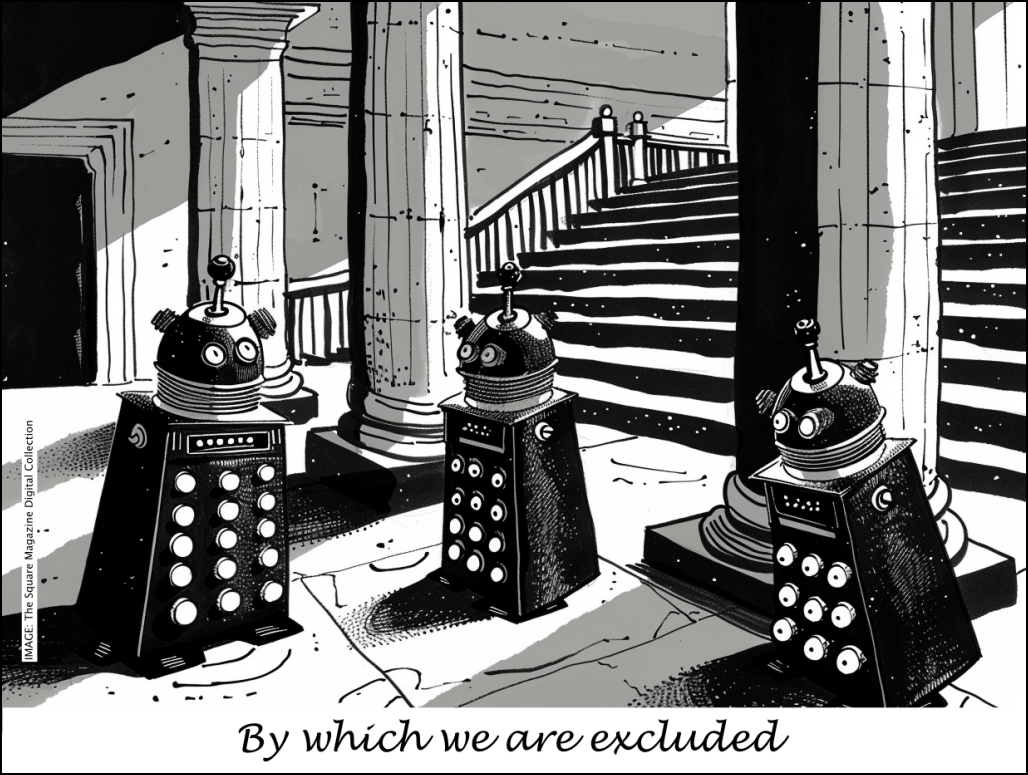
The pocket, heart, hand of masonry has ever moved for those who are excluded. Urgently, this is an opportunity for Freemasonry, a movement for mutual improvement, to prevent digital exclusion or at least, substantially facilitate its mitigation.
Jurisdictions and businesses seek a cashless economy; yet, the significant number of digitally powerless people (UK 25% and not all of these are senior citizens) are perhaps delaying its implementation.
If so, this a triumph for their civil society groupings and electoral sway. Yet in the shift to digital, public services have not been accompanied by adequate support; and thereby, a state-led exacerbation of digital exclusion. Might this be attacking an ability to inform decision-making in civic life: attacking an ability to partake in civil society:?
Jurisdictions; business; and, civil society – which includes Freemasonry – could provide leadership and direct participation to ensure a victimless introduction of a ‘cashless’ economy. How might this be enabled and facilitated? Now extend such a process to the rolling-out of IR4.
AI is perhaps one of the most talked about subjects on the planet, associations with world-citizenship leanings could unite to ensure a victimless IR4. However, the continuity of the governance-model of: government, business and civil society cannot be assumed. Given the, seemingly, unsustainability of sovereign, corporate and household debt, might ‘reset’ be the 2024 word.
Might a reset change the dynamic of government, business, and civil society? Might governments be tempted to use AI to substantially cut the level of administrative employees even though they are unable to finance repayment and compensation claims arising from previous IT applications.
Could an opportunity be taken for civil society to be ‘reset’ to achieve an influence far more commensurate with its contribution than hitherto?
Traditionally, wealth was based on the ownership of land; followed by the ownership and control of the means of production; now, the ownership and control of data. Civil societal action depends on the tools provided by tech companies.
To date, the suppliers of mechanical levers and wedges have not dictated their use. How in a reset, might civil society be commensurately influential and avoid the digital disruption of its efforts? Perhaps by building resilience through thinking globally and acting locally
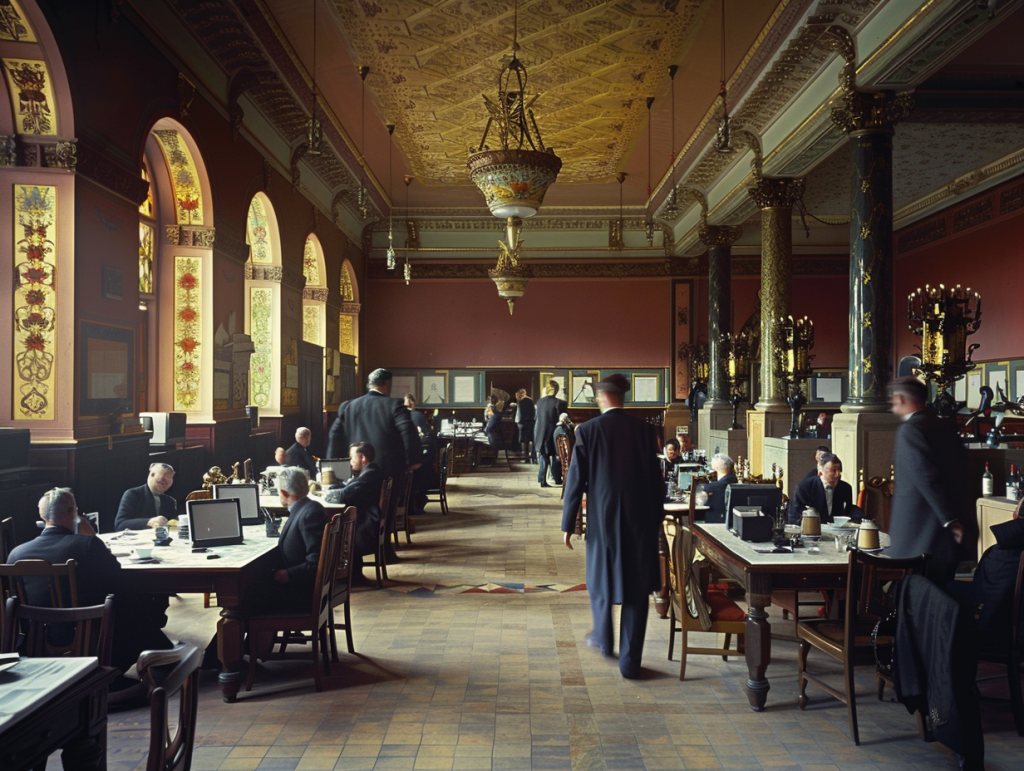
Digital Retraining in the Masonic Dining Room
IMAGE: The Square Magazine Digital Collection
Article by: Gerald Reilly

Gerald Reilly was initiated in 1995 into St Osyth's Priory Lodge 2063. Essex. England (UGLE).
He was a founder member of Josh Heller's Allthingsmasonic, and with Josh co-wrote 'The Temple that Never Sleeps' (Cornerstone Books, 2006) he is committed to the development of e-Freemasonry.
Awarded the Norman B Spencer Prize, 2016.
Book: by Gerald Reilly

The Temple That Never Sleeps
by Josh Heller and Gerald Reilly
Freemasons and E-Masonry Toward a New Paradigm
A revolutionary book for every Freemason.The two authors, American and UK Masons, present a radical view of Freemasonry for both today and tomorrow.
In addition to their ideas are those of numerous Internet Masons (E-Masons) from around the world who, by sharing the experience of their own Masonic journey, have provided stunning personal insight into the viability of the Craft in the Internet Age.
This book will challenge your understanding of Freemasonry today and how it might transform for future generations.
Recent Articles: by Gerald Reilly
 How can the allegory of the Tower of Babel teach us tolerance? Language can be a divide. Not confusion among languages but rather within language, a seriously unclear understanding of another’s world-view. We assume it is so different from our own and yet with clarity, a realisation there is more which unites than separates. |
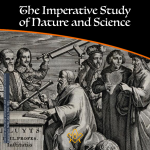 The Imperative Study of Nature and Science At some stage during Freemasonry's Second Degree, the candidate is advised that there is now permitted, something like, the extension of their research into the hidden mysteries of nature and science. Such is an excellent permission and one that each and every Freemason should pursue with awe and passion. |
 Pure Ancient Masonry; P4. A Companion in Rule, Building a better world P4. A Companion in Rule, Building a better world - The four parts of Pure Antient Masonry comprise the ‘body’ Masonic; they are the building blocks of the vital relevance, through enhanced citizenship, wherein the soul of Freemasonry abides. |
 Pure Ancient Masonry; P3. The Master, Building Better Character Part 3: The Master, Building Better Character - Being raised is a transition from knowledge to wisdom. |
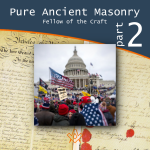 Pure Ancient Masonry; P2. A Fellow of the Craft Part 2: A Fellow of the Craft, Building Better Knowledge. Pure Antient Masonry consists of four parts. ‘Building the Temple’ is the fundamental Masonic allegory for building better people; this must be understood as a seamless whole: |
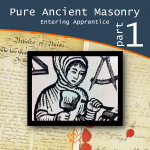 Pure Ancient Masonry; P1. An Entering Apprentice Part 1. An entering apprentice: Building Better Communities; Pure Antient Masonry consists of four parts. ‘Building the Temple’ is the fundamental Masonic allegory for building better people to build a better world |
 Pure Ancient Masonry; Intrduction This series will consider the defining characteristics, lessons and benefits of Three Degrees, the Order of the Royal Arch and when conjoined, Pure Ancient Masonry. |
 The Christianising of British Freemasonries - P4 This concluding article in the series considers the separation of British freemasonries from the Grand Orient of France (GOdF) and maintaining fraternity with the Prussian Grand Lodge of the Three Globes. |
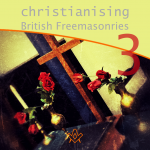 The Christianising of British Freemasonries - P3 Discover the battle for the 'soul' of Masonry. Part 3. French Perdition: ‘…for what fellowship hath righteousness with unrighteousness’? |
 The Royal Arch – ‘the fourth step in regular Freemasonry’ United Grand Lodge of England, has now designated the Royal Arch, the fourth step in regular Freemasonry, it therefore must be concluded that…publications…should now be revised, and based on attracting to the benefits of the four steps. |
 The Christianising of British Freemasonries - P2 How might the battle for the souls of Freemasonries be identified in a way that ensures thriving in the 21st Century? There is no guarantee of the immortality of the soul of Freemasonry! ‘We study the past in order to free ourselves from it.’ (Hariri) |
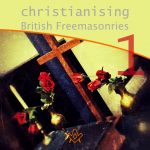 The Christianising of British Freemasonries - P1 This four-part series considers: 1. the separation of British Freemasonries from the Grand Orient of France (GOdF); and, 2. maintaining fraternity with the Prussian Grand Lodge of the Three Globes. |
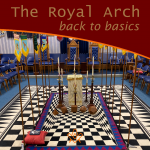 The Royal Arch - Back to Basics In the Royal Arch ceremony, the sojourners are buried with their tools in a vault. The sun, at its highest, provides enlightenment and the principal sojourner is returned to the former companions of his toil |
 The Holy Land and the Holy Sites P4 Fourth instalment of the four-part series, considers ‘masonic’ aspiration and activity regarding the Holy Land and The Holy Sites |
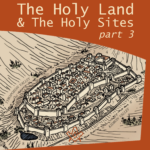 The Holy Land and The Holy Sites P3 Third instalment of the four-part series, considers ‘masonic’ aspiration and activity regarding the Holy Land and The Holy Sites |
 The Holy Land and The Holy Sites P2 The four-part series will consider ‘masonic’ aspiration and activity regarding the Holy Land and The Holy Sites |
 The Holy Land and The Holy Sites P1 In this four-part series, we will consider ‘masonic’ aspiration and activity regarding the Holy Land and The Holy Sites |
 Science and Citizenship: Towards a 21st Century Masonic Mindset. |
 Towards a 21st Century Masonic Mindset: Part 3 ‘Freemasonries’ and the Fourth Industrial Revolution |
 Towards a 21st Century Masonic Mindset: Part 2: ‘Freemasonries’ and Religiosity. |
 Towards a 21st Century Masonic Mindset: Part 1: ‘Freemasonries’ and Governance. |
masonic knowledge
to be a better citizen of the world
share the square with two brothers

click image to open email app on mobile device






